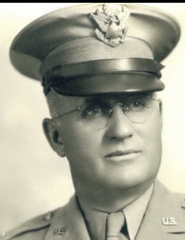Americans, Jews Fare Badly In Hands of German Captors
By Frank Miles
(Daily Times Herald War Correspondent)
In Germany (IDPA) -- The 112 American prisoners of war taken to the Brabag synthetic oil plant at Seit Troglitz to work in January were too weak to do anything. Frederich Przyblka, acting technical director, told United States army officers and war correspondents.
"Why were they so weak?" I asked
"That's the way they come from the front," he replied with what some listeners thought was half sneer. A woman writer promptly refused this suggestion.
Two British soldiers, liberated by the American First army but still in their miserable barracks, said eight American captives died. They and comrades buried them in the Zeitz cemetery. Our group went there. Burial services were being held. Lying around on the ground were bodies of Germans, victims of American conquest and a recent air attack. We failed to find the graves we sought. A well dressed, smug, elderly custodian declared he had no knowledge of any American interned.
The rest of the American captives returned to our forces by joining in the British in a successful "sit down" strike When our fighting doughboys approached, German guards ordered prisoners to leave with fleeing nazi soldiers. Tommies and Yanks would not budge. Guards, fearing capture, left without harming them.
One of the British liberated by Americans had an ugly cut on his head from a clubbing by a nazi guard. He asserted Jewish prisoners were treated badly and that Americans were dealt with almost as harshly.
"In fact," he gritted, "the Jerries were so tough on the Jews and Yanks we Limey told 'em we'd raise plenty of hell if they didn't ease up and they did a little."
American bombers in a series of raids virtually had put Brabag plant out of commission, a blow to the Nazi war machine.
"We had several thousand German workers here and others from 17 nations," Przyblka stated.
"Didn't think you had conquered that many," a scribe commented.
Przyblka smirked.
He was about 40 years of age, medium height, thin wiry. His knickers revealed that he was bow legged. Standing behind and to the left of where he was seated, I caught him controlling the words of the interpreter with expressions from his dark, blue eyes and severe, smooth face.
"Bruno Haputman," a news photographer called him. A reporter, who had covered the trial of the Lindberg baby killer, said the implied description was pat.
"In your frantic efforts to repair destruction after each bombing did you ever have any sense of frustration?" he was asked.
"We were like soldiers," he replied. "We had to so what were were told to do. What was ordered was done."
The immense Mersburg plant -- 4000 by 12000 yards in area -- producing war supplies from benzine, nitrates and alcohol, had been rubbled by American and British bombers in 22 attacks. In some of them, my son, Lieutenant Frank Miles, Jr., an Eighth air force B-17 bombardier, participated. The plant had 35,000 workers of whom 10,000 were foreign. It was defended by more than 20,000 soldiers with more than 400 flak guns and the Luftwaffe, powerful enough last November 14, to participate one of the greatest battles of the war.
"We carried out orders to reconstruct to the best of our ability," said Dr. Christian Schneider, the pompous director at his spacious residence. "Whether we thought we were doing wise or not, I do not care to discuss." A American shell exploded near enough to rattle the house while we were talking.
His personnel manager saw two American fliers, who parachuted to earth after their planes had been shot. He denied civilians there ever had tried to mob Yanks who had so come among them.
Source: Carroll Daily Times Herald, May 17, 1945![]()

